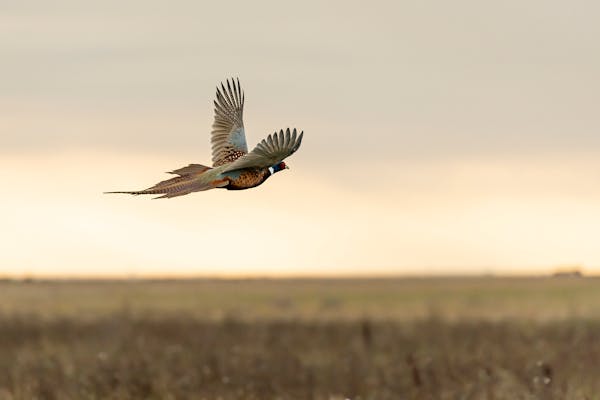Minnesota filmmaker Matt Addington of Cannon Falls stumbled into a can't-miss story when he met Keng Yang, a young Twin Cities techie reborn as an avid pheasant and waterfowl hunter.
Yang wasn't merely a nonhunter before he first picked up a shotgun as an adult. He was a nature-loving, anti-hunter who shuddered at his own father's pursuit of deer, upland birds and other wild game.
Then came Kaiya, a female German Wirehaired Pointer. The puppy was acquired by the elder Yang for future breeding — a life that his son viewed as limited. On an impulse, Keng adopted the puppy and felt an instant change of heart.
"I started to ask myself what's the best life I can give her,'' he said. "She's a hunter. That's what will make her happy. I'll hunt."
Addington's 16-minute movie, "Kaiya,'' is premiering this week with other hunting movies at the National Pheasant Fest & Quail Classic in Minneapolis. Far beyond a typical story about adult-onset hunting, the film conveys how Kaiya healed an emotional rift between a father and son who were born in different worlds.
Tony Yang was raised in a Hmong clan in Laos where hunting wild game of all kinds, in all seasons, was mostly for sustenance. He immigrated to the U.S. and in 1988 married his sweetheart, Lee Moua. Keng was born to them in San Diego, but the family moved to north Minneapolis when he was 3.
Later, they moved to Crystal and then to Brooklyn Park near a creek where Keng fell in love with wildlife, once raising a brood of abandoned ducklings. As a student at Osseo High School, he was thrilled to take a course in wildlife biology.
Raised by parents who placed a strict emphasis on education, with few extracurriculars, Keng obsessed over waterfowl, their migrations and other wild creatures as "an escape from home,'' he said.
Increasingly, he was repulsed by his father's hunting dogs, and the wild game he brought home for meals.
"Why do we need to kill animals?'' Keng said in the film when reminiscing about the divide between him and his father.
Merging styles
In pheasant fields, Tony Vang likes to split up from hunting partners and work fast. He's always hunted with German wirehaired pointers because he likes their drive and tenacity. He doesn't walk in straight lines and he's always chasing his limit of whatever species he's hunting. He rises early, barely breaks for lunch and spends as little money as possible on his outings.
Once Keng had his epiphany about hunting, his dad became his sink-or-swim mentor. But the film shows how they learn from each other. Keng is slower and more methodical, but just as excited when there's a flush and a kill. Tony Yang is not outwardly affectionate toward his son, but he exudes pride during scenes when they're afield together. Their lives changed when Keng, at age 27, shot his first pheasant over his own hunting dog.
Now the two of them live together. Jackie, a puppy from Kaiya's first litter, belongs to Tony.
"Me and my dad, we're butting heads no matter what,'' Keng said in a recent interview. "But hunting has given us a better relationship.
"I would have never learned from my dad or about my dad,'' he said. "I'm so thankful I started hunting.''
Seeing the light
Keng's day job is in information technology at a national health insurance company based in the Twin Cities. At 33, his dream is to find new work that's aligned with his passions for hunting, habitat conservation and mentoring.
The movie "Kaiya'' ends at dusk with Keng, Kaiya and others finishing a late-season pheasant hunt on cropland. If there were to be a sequel, it would open at dawn in a duck blind with Keng and Kaiya mentoring newbie waterfowlers on public land.
He said his excitement about hunting was greatly enhanced by the realization that Minnesota contains a wealth of public lands managed for wildlife. As he waited for shooting hours to open on his first pheasant hunt at a wildlife management area near Marshall, he was awed by the sunrise, the horizon, the prairie, the breeze, singing songbirds and the solitude.
"You can come to this country from any background and know that this public land is yours,'' he said. "Yes, you're killing (game animals) but it also makes you want to protect those places and make more'' wildlife habitat, Keng said.
Instinctually and strictly self-guided, he's been devoting a lot of his spare time recruiting friends and strangers to start hunting as adults. He's aware that hunting needs an infusion of new hunters.
Keng studies locations and takes advice from online discussion groups, webinars and face-to-face meetings to expand his own knowledge and make the most of his mentored outings. He has found that there's nothing like bagging a pheasant, duck, goose or wild turkey to sustain the interest of a prospect. His repertoire also includes door-knocking houses in favored rural areas for permission to hunt private land.
"All my success with people starts with a handshake and a friendship,'' he said.
Along the way, he's made notable connections with the likes of Addington, the co-founder and chief creative officer of Resonate Outdoors media company.
His circle of friends has expanded with a multitude of volunteer assignments in organizations like the North American Versatile Hunting Dog Association, a local chapter of Delta Waterfowl, the Minnesota Conservation Federation, Backcountry Hunters & Anglers, the Minnesota Department of Natural Resources' Natural Heritage Advisory Committee, and the Minnesota R3 Council, a group organized for recruiting, retaining, and reactivating hunters.
"Keng was the largest part of me tagging a turkey last year,'' said Derron Wahlen, who heads the Southeast Metro Chapter of Delta Waterfowl. "He certainly has a wonderful passion about hunting.''






